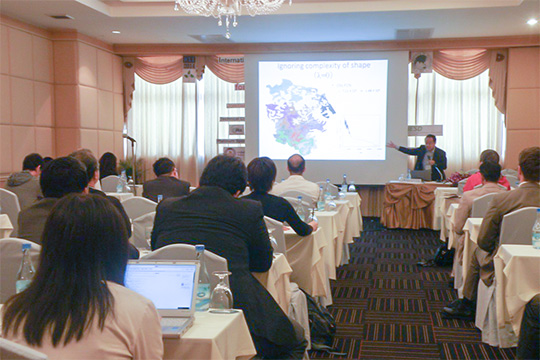2014年5月号 [Vol.25 No.2] 通巻第282号 201405_282004_en
Report on GCP Tsukuba Office contribution to ICUE 2014
The International Conference and Utility Exhibition on Green Energy for Sustainable Development (ICUE 2014) was held from 19 to 21 March 2014 in Pattaya City, Thailand. Researchers, engineers, policy makers, etc. from different parts of the world convened to exchange ideas, research findings, and experiences on issues related to green energy and sustainable development. Participants discussed various strategies for achieving green and sustainable future developments. In particular, there was a focus on developing alternatives for the current fossil fuel-based economy that has caused severe problems in terms of environmental pollution, and greenhouse gas emissions. Through organizing two special sessions, GCP-Tsukuba International Office had an active participation during the conference. Overall, 12 studies related to climate-compatible urban development were presented during the two sessions.

Session organized by the GCP Tsukuba International Office (Courtesy of ICUE 2014)
The first session was mainly concentrated on the mitigation of climate change. Presentations were mainly concerned with renewable energy technologies and spatial, structural, institutional, and behavioral mechanisms required for their implementations. The geographical scale of these studies was diverse and covered building, district, municipal, and regional levels. Among others, these issues were presented and discussed: arrangements necessary to facilitate adoption of (Photovoltaic) PV in agriculture sector; potentials of PV energy generation in the urban area and its implications for low-carbon urban development; development of downscaling simulation methods for estimating hourly electricity demand data of households and urban blocks; innovative scenarios for replacing the current car fleet in Tokyo (which is mainly unused during weekdays) with electric vehicles and using their batteries to store energy and link it to gird; scenarios for future compact cities that consider co-benefits and trade-offs between climate change adaptation and mitigation measures; utilization of electricity consumption metering and online visualization systems at the household level as an instigator of behavioral change towards sustainable energy consumption; and development of agent-based simulation models to investigate the possibility of using electricity sharing systems.
The second session’s main theme was development of mechanisms for adaptation to climate change. In particular, there was an emphasis on the issue of resilience thinking. Speakers pointed to the increasing vulnerabilities caused by climate change and discussed the importance of using resilience assessment frameworks for addressing these vulnerabilities. Major issues discussed include: utilization of communication systems to calculate risk indicators based on observation data; significance of clarifying the conflicting and complementary resilience principles and establishing an evolutionary multi-agent system for evaluating the effectiveness of resilience principles; development of a methodology to introduce controlled shocks into the system to regulate the build-up of complexity and rigidity among its components and their connections; development of a comprehensive index for assessing resilience of urban environments that can be used as a decision support system; and using sky view factor as a method for determining the optimized building-height ratio in urban canyons with the aim of minimizing the urban heat island effects. Both sessions were well attended and at the end of presentations participants actively involved in discussions on synergies and trade-offs between mitigation and adaptation and the implications of resilience thinking for sustainable development.
- List of Participants:
- Ayyoob Sharifi, Simon Benger, Thomas Brudermann, Hiroshi Maruyama, Kazuhiro Minami, Roberto Legaspi, Yoshiki Yamagata, Hajime Seya, Daisuke Murakami, Kei Hiroi, Kanae Matsui.


